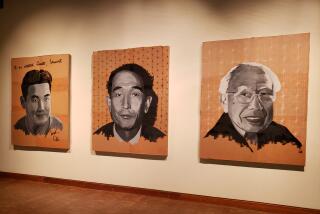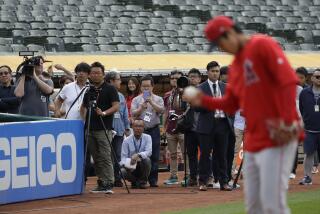FICTION
- Share via
FIVE THOUSAND RUNAWAYS by Takeshi Kaiko; translated from the Japanese by Cecilia Segawa Seigle (Dodd, Mead: $15.95; 191 pp.). Takeshi Kaiko is one of Japan’s more prominent modern writers, and the eight short stories here are clearly meant to offer us a 20-year spectrum of his career. Yet the striking similarities in the tales suggest little if any growth.
All his protagonists are male and mass-produced. They are usually single men, devoid of family ties or neighborhoods or pasts. They have quirky needs rather than emotions. One needs to find the best fishing hole in Japan; another needs to find truth in manual labor; a third needs to get close to battle. Many of them are nameless functionaries--reporters or intellectuals.
Striking, too, is Kaiko’s repetitive use of scene and metaphor. Fully half of the stories take place in Vietnam during the recent war, and at least half also involve the rites of fishing. Kaiko has lots of moral and allegorical points he wants to score (there is endless discussion of “struggle”--whether in war or between man and beast) but whenever he ventures away from Japanese soil to make them he loses all sense of authenticity.
The title story, the most intriguing of the lot, describes a well-bred Tokyo businessman who impulsively drops out of his normal existence to manage a sleazy nightclub in Osaka. There is a Kafkaesque quality in his act, a sweet, downward spiraling that fills the reader with sympathy, hope and dread. Then, just as we realize how much we care about this character, Kaiko inexplicably puts him on a train and sends him back to his family and former life. In the end he settles for less. We must as well, and it just doesn’t work.
More to Read
Sign up for our Book Club newsletter
Get the latest news, events and more from the Los Angeles Times Book Club, and help us get L.A. reading and talking.
You may occasionally receive promotional content from the Los Angeles Times.










